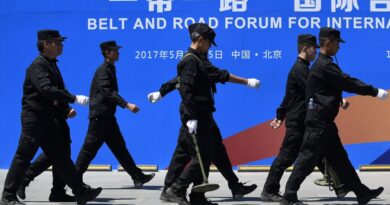Foreign Investment Into China Hit 3-Year Low in January
Despite Beijing’s efforts to woe back investors, China saw a record high of $168 billion in net foreign direct investment withdrawal in 2024.
Foreign direct investment into China declined by 13 percent year-on-year in January, official data released on Feb. 19 show, highlighting the difficulties Beijing faces in winning back foreign companies amid ongoing geopolitical tensions.
The Chinese Ministry of Commerce reported that utilized foreign direct investment plummeted to 98 billion yuan ($13 billion) in January, marking the lowest start to the year in three years. This figure is down from 113 billion yuan ($16 billion) in the same month last year and from 128 billion yuan ($18 billion) in January 2023.
Beijing’s Ministry of Commerce, meanwhile, added the PVH Group, a U.S. retail giant that owns brands such as Calvin Klein and Tommy Hilfiger, and Illumina Inc., an American gene sequencing company, to its trade blacklist, known as the “unreliable entities list.” Companies on this list are prohibited from participating in import and export activities and from investing in China.
Amid escalating geopolitical tensions and an economic downturn, China has sought to woo back overseas investors. On Feb. 18, the regime rolled out an initiative pledging to create new incentives aimed at stabilizing foreign investments in 2025.
Chinese officials repeatedly reaffirmed the regime’s commitment to supporting international businesses. On Feb. 17, Vice Premier He Lifeng hosted a group of Japanese business executives in Beijing, encouraging them to expand their investments in China.
‘Most Restrictive Investment Climate’
Nevertheless, the momentum of the foreign capital exodus appeared to show little sign of easing. Over the past year, actual foreign investment fell by 27 percent, following an 8 percent decline in 2023, according to data released by the commerce ministry on Jan. 17.
This downturn was also reflected in figures from China’s State Administration for Foreign Exchange (SAFE), which gauges foreign investment on a net basis.
Outside observers say the decline in investment might be more severe than the official figures indicated, pointing to Beijing’s stepped-up efforts to stabilize overseas investment.
“With so many measures being rolled out, the outflow of foreign capital has reached a point that scares the Chinese Communist Party,” Frank Tian Xie, a professor in the School of Business Administration at the University of South Carolina Aiken, told The Epoch Times.
Xie expressed skepticism regarding Beijing’s incentives to draw back foreign investors, pointing to the contradictions in its approach. While Chinese officials urge overseas and private companies to maintain or increase their investments, in an attempt to help revitalize the economy, they simultaneously tighten control over these companies and demand adherence to the Chinese Communist Party’s directives.
“The Chinese communist regime continues to exert pressure even while seeking help. It’s no wonder that foreign investors are hesitant about staying in the country,” Xie said.
The Trump administration also highlighted U.S. businesses’ concerns on the State Department’s website.
“China also engages in unfair trade practices, including using forced labor and massive state subsidies, putting American businesses at a disadvantage and making them complicit in China’s human rights abuses.”
Luo Ya contributed to this report.





